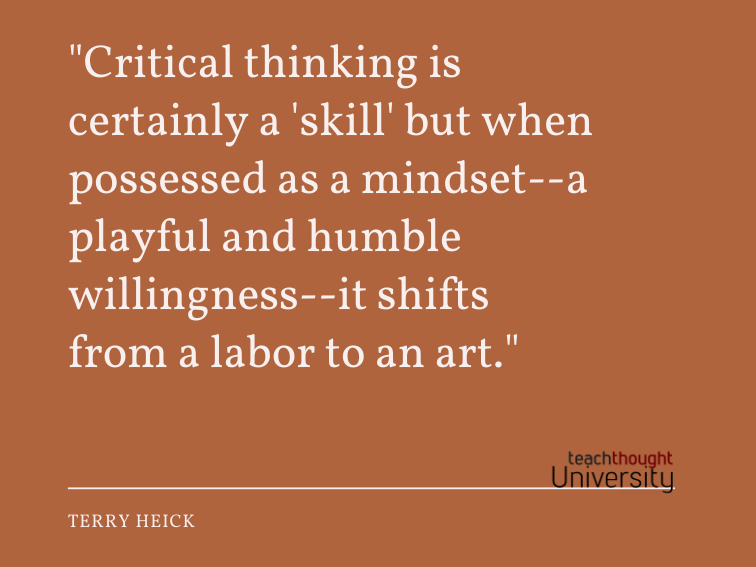

by Terry Heick
Every couple of months, I see a write-up making the rounds that essential reasoning isn’t an ability and for that reason can’t be educated.
And due to the fact that it’s additionally difficult to gauge and modern-day public education and learning is driven by measurement, as an idea it kind of sits in the edge, unresponsive and mute.
Frequently, these short articles remain in regards to a discussion or research study related to Daniel Willingham, a psychologist at the University of Virginia who is frequently related to this kind of insurance claim. Even though my instinct is to differ, Willingham, naturally, knows much more regarding this subject than I do so my goal here is not to disagreement that claim.
I do, nonetheless, think it’s feasible that we might misinterpret what it indicates to assume seriously, which I’ve discussed (though seldom or well enough) lot of times. In The Meaning Of Essential Believing , for example, I said:
Crucial reasoning is amongst the initial causes for adjustment (individual and social) however is a pariah in institutions– for nothing else reason than it conditions the mind to suspect the kind and function of everything it sees, including your class and every little thing being educated in it. Of course, crucial thinking without expertise is embarrassingly still, like a farmer without a field. They need each other– idea and expertise. They can additionally vanish into each other as they function. As soon as we have actually developed that– that they’re separate, capable of merging, and need each other– we can get at the marrow and fear of this whole thing.
Terry Heick
After viewing the result of disinformation on recent national and worldwide events, it has actually struck me that important reasoning is less of a skill and even more of a desire or routine. In other words, essential thinking is an attitude. As I’ve stated before about analysis– below, for example, in Why Pupils Should Check out — is that while it is essential that trainees can read, it’s more important that they do read.
And critical reasoning– believing rationally, with factor and evidence, humility and expertise, understanding and uncertainty– is similar: it is essential that trainees can believe critically but it’s more important that they do believe critically.
This way, important reasoning has to be a mindset.
Crucial Thinking Is A State Of Mind
Arstechnica (somewhat) just recently covered how set attitudes hurt thinking in discussing Why Can Only 24 % Resolve Bayesian Reasoning Problems in All-natural Regularities: Regularity Phobia in Spite of Likelihood Blindness
Equally as math can be said to be a kind of language and science is a way of thinking, vital thinking (while also being a ‘means’ of thinking) is initially a state of mind– a readiness to do so both came before and proceeded by a motley collection of presuppositions and facilities and propensities and cognitive defaults and also at some point personality traits that materialize when you review a publication or have a conversation or skim a news heading or research a concept.
Essential thinking is absolutely a ‘skill’ yet when had as an attitude– a lively and humble willingness– it moves from a labor to an art. It asks, ‘Is this true? By what standard? Who would disagree and why? What is the background of this problem or topic? What am I missing? What sort of understanding am I missing to comprehend this extra closely and how can I obtain them?
Essential thinking as a skill tries to understand.
Important reasoning as a frame of mind reads and pays attention as a witness and is haunted by what it doesn’t understand and can not comprehend and after that, from that starting factor, begins the procedure of factor– of being and coming to be reasonable
Critical thinking isn’t psychological due to the fact that its identity isn’t wrapped up in a viewpoint or ‘belief’ and being ‘incorrect’ is valuable due to the fact that it gets us closer to being ‘right.’
Essential reasoning is almost difficult to apply without some sort of bias yet, as a way of thinking, it watches for its own predispositions (see the definition verification prejudice , for instance) as a security guard may expect strangers.
Critical reasoning is slow-moving to choose and may not ‘make a decision’ in any way because it understands that when faced with brand-new evidence, it has to reconsider. And again. And again.
And, as a frame of mind, it’s all right with the labor of everything since it values reason greater than favor with groups; it prefers precision over perceived accuracy and experiences any circumstance dewy-eyed and simple and interested, looking for to comprehend and terrified to death of bias and insufficient knowledge and sensible misconceptions and various other cognitive misbehaviors that might lead it astray.
See? Critical thinking is an ability yet it’s likewise a tendency and characteristic and light-making device in darkness for several becomes a frame of mind– both a way of recognizing and a means of being.
And this is all component of way training it as an ability– similar to instruct students how to review rather than why– is part of our challenge in education and learning. As usual, we are asking the wrong questions.
Crucial Assuming Is A Way of thinking